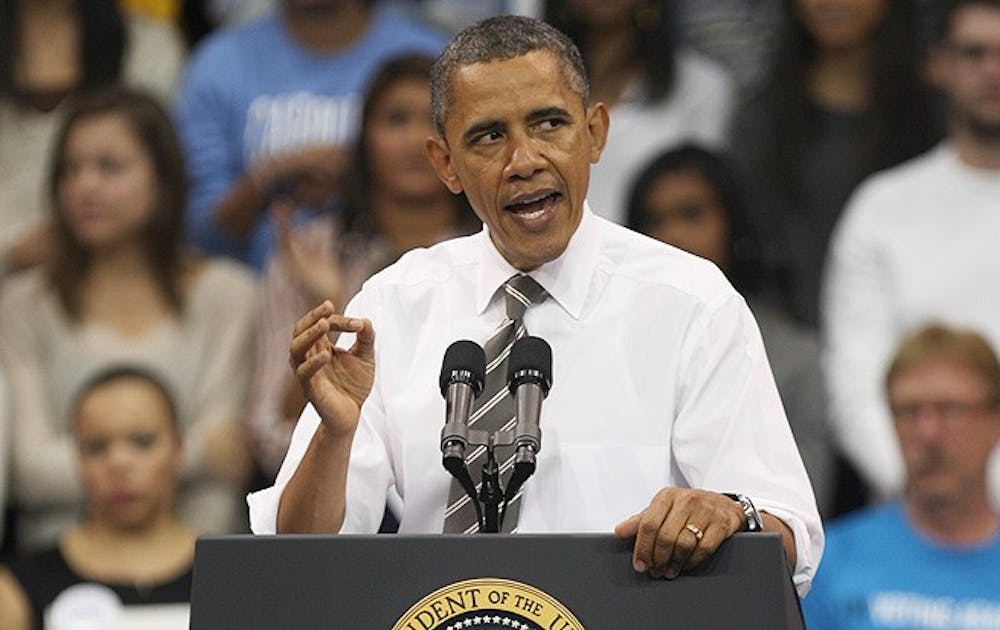President Barack Obama urged Congress to keep college affordable for the seven million students currently burdened by student loans in an address Tuesday at the University of North Carolina at Chapel Hill.
Obama told a crowd of more than 8,000 students, professors and Chapel Hill residents that student loan interest rates will double overnight July 1 if Congress does not take action. Shortly after assuming office, the Obama administration reduced rates for student loan programs to 3.4 percent from 6.8 percent. Without an extension, the rate will revert back to 2008 levels. The White House is currently in negotiations with Congress to find funding for the $5.9 billion measure, but the president has taken the discussion public with the hopes of garnering youth support.
“We have to make college more affordable for our young people—that’s the bottom line,” Obama said. “Since most of you were born, tuition and fees at America’s colleges have more than doubled. And that forces students like you to take out a lot more loans.”
For each year that Congress does not act, the president said the average student with loans will rack up an additional $1,000 in debt. Student loan debt is not only stifling young Americans’ access to higher education, but it is curbing the economy’s growth, Obama added. Student loan debt has reached an estimated $1 trillion, surpassing credit card debt in the country for the first time in history.
“In America, higher education cannot be a luxury,” said Tom Harkin D-Iowa, chairman of the Senate Committee on Health, Education, Labor and Pensions in a press conference call Monday. “The clock is ticking for seven million students.”
Student loan debt is a familiar issue for the president. Referring to the “mountain of debt” he and his wife, Michelle Obama, faced after graduating from college and law school, Obama said he is committed to making sure the middle class continues to gain access to higher education. The president also took a jab at presumptive Republican presidential nominee Mitt Romney’s elite background as a detriment to understanding the needs of students who pay back loans.
“I didn’t just get a policy briefing on this,” Obama said. “Michelle and I, we’ve been in your shoes.”
Monday, Romney also came out in support of extending the current student loan interest rate. This move may diminish Obama’s efforts to challenge Romney’s stance on federal university funding.
“With the number of college graduates who can’t find work or who can only find work well beneath their skill level, I fully support the effort to extend the low-interest rate on student loans,” Romney said before a campaign event in Astor, Penn. Monday.
In his address, Obama said issues of student interest are not partisan issues, and Romney’s endorsement of the rate extension supports the president’s desire for this policy to cross party lines. But Romney’s critics, including the president, said his backing of Congress’ extension is inconsistent with his previous stance on federal funding for college education. The Ryan budget, proposed by Rep. Paul Ryan R-Wis., will cut funding for Pell Grants by up to 25 percent, reducing the average grant for North Carolina students by $830. This plan would also compromise research funding and work-study programs. Romney is an active supporter of the Ryan budget which was passed by House Republicans March 29.
Romney’s statement on student loans has struck commentators as a political ploy, said Pope McCorkle, visiting lecturer of public policy studies.
“He’s making the move to the center,” McCorkle said. “It looks ugly. It looks awkward. This may be low-level enough that it doesn’t get too much public attack, but this is Romney trying to change his colors once again.”
Obama directly addressed Romney’s attitudes toward university funding in his speech, arguing that a vote for the rate extension and a vote for the Ryan budget are counterproductive to college affordability.
“Some have hinted that they’d only [vote for the rate extension] if we cut things like aid for low-income students instead,” Obama said. “That doesn’t make sense.”
Federal student loan policy is a particularly pertinent issue to students at UNC-Chapel Hill, Chancellor Holden Thorp said in his introduction to Obama’s speech. Although only one-third of UNC-Chapel Hill students use federal loans to pay for college—lower than the national average—the university recently faced a state budget cut of $100 million this academic year. Since 2008, UNC-Chapel Hill has been hit with more than $231 million in total state cuts, leading to a nearly 10 percent hike in tuition and fees.
Kayla Kennedy, a senior at UNC-Chapel Hill, was drawn to Tuesday’s event because she will soon have to start paying off student loan debt she has accumulated. A first-generation college graduate, Kennedy said she is fearful of the increased debt she will owe if Congress does not extend the interest rate.
“The closer that you get to graduation, the more you realize that the debt you’re in is not Monopoly money,” she said. “It’s real numbers you’ll have to deal with when you leave school.”
The president’s two-day campaign tour will also make appearances at the University of Colorado at Boulder and the University of Iowa. The three universities are in states Obama narrowly won in the 2008 election and which are expected to be swing states in the upcoming election.
Yeshwanth Kandimalla contributed reporting.
Get The Chronicle straight to your inbox
Sign up for our weekly newsletter. Cancel at any time.

